Discussion Questions: CNO, International Nurse Recruitment, and Ethics
VerifiedAdded on 2022/10/09
|7
|1428
|16
Homework Assignment
AI Summary
This assignment addresses two discussion questions related to nursing in Canada. The first question examines the role of the College of Nurses of Ontario (CNO) in setting standards, providing professional support, and advocating for nurses and patients. The CNO influences patient safety through regulations, professional development through seminars and workshops, and advocacy for healthy public policies. The second question discusses the advantages and disadvantages of recruiting internationally educated nurses in Canada. The advantages include diversity and filling gaps in the healthcare sector. However, disadvantages include ethical concerns such as brain drain from developing countries, potential workplace harassment, and language/cultural barriers. The assignment highlights the need for Canada to balance the benefits of international recruitment with the ethical responsibilities towards sending countries.
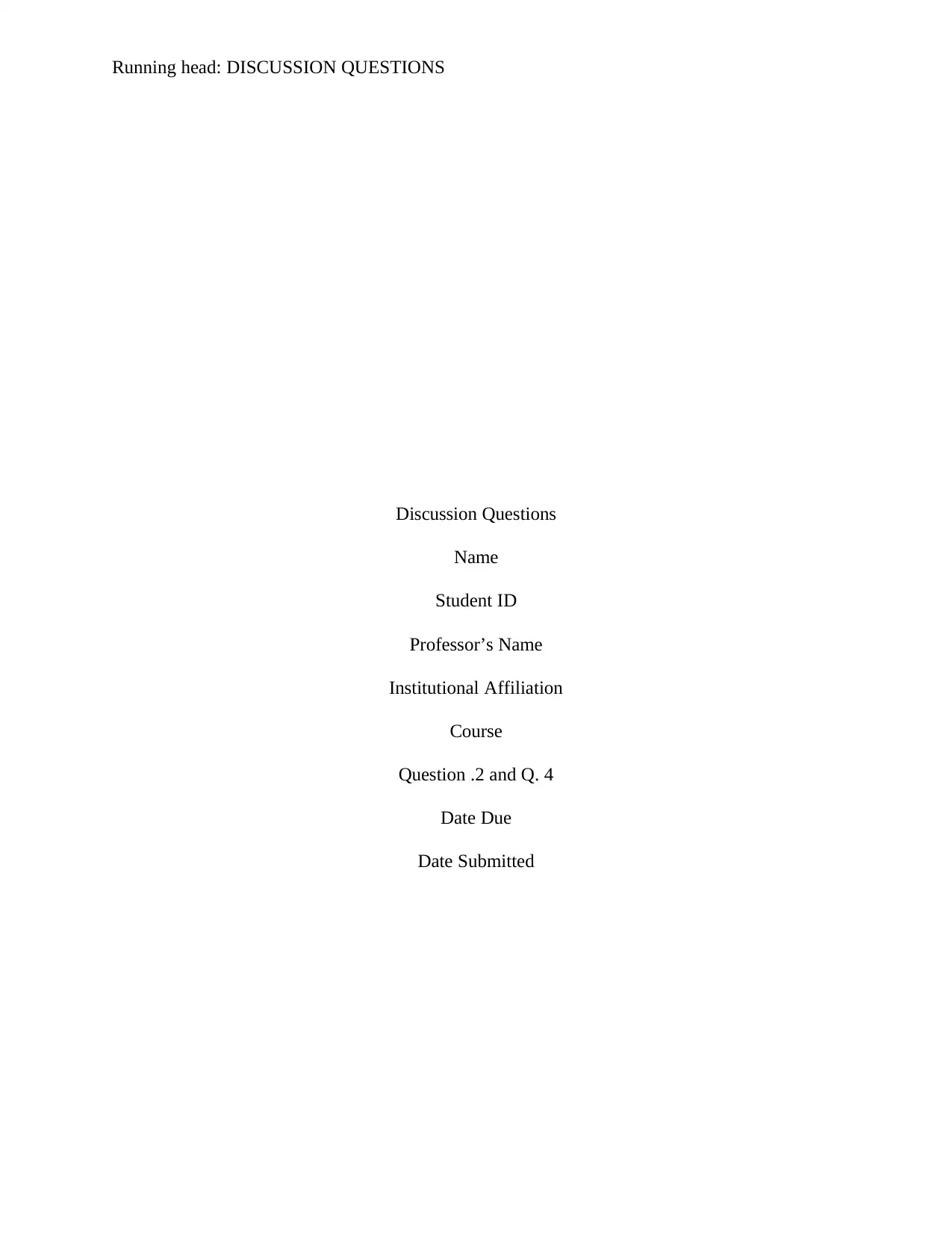
Running head: DISCUSSION QUESTIONS
Discussion Questions
Name
Student ID
Professor’s Name
Institutional Affiliation
Course
Question .2 and Q. 4
Date Due
Date Submitted
Discussion Questions
Name
Student ID
Professor’s Name
Institutional Affiliation
Course
Question .2 and Q. 4
Date Due
Date Submitted
Paraphrase This Document
Need a fresh take? Get an instant paraphrase of this document with our AI Paraphraser
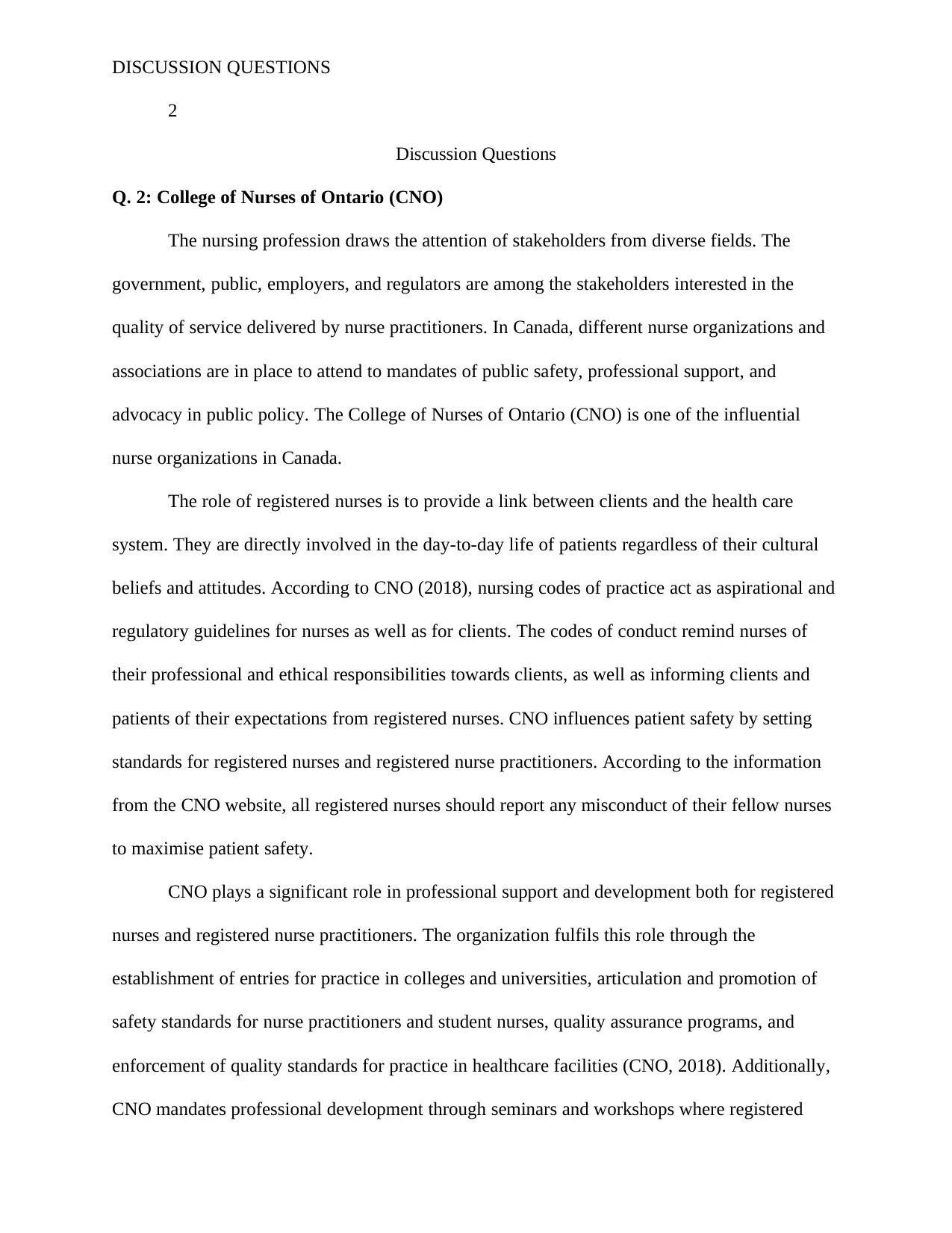
DISCUSSION QUESTIONS
2
Discussion Questions
Q. 2: College of Nurses of Ontario (CNO)
The nursing profession draws the attention of stakeholders from diverse fields. The
government, public, employers, and regulators are among the stakeholders interested in the
quality of service delivered by nurse practitioners. In Canada, different nurse organizations and
associations are in place to attend to mandates of public safety, professional support, and
advocacy in public policy. The College of Nurses of Ontario (CNO) is one of the influential
nurse organizations in Canada.
The role of registered nurses is to provide a link between clients and the health care
system. They are directly involved in the day-to-day life of patients regardless of their cultural
beliefs and attitudes. According to CNO (2018), nursing codes of practice act as aspirational and
regulatory guidelines for nurses as well as for clients. The codes of conduct remind nurses of
their professional and ethical responsibilities towards clients, as well as informing clients and
patients of their expectations from registered nurses. CNO influences patient safety by setting
standards for registered nurses and registered nurse practitioners. According to the information
from the CNO website, all registered nurses should report any misconduct of their fellow nurses
to maximise patient safety.
CNO plays a significant role in professional support and development both for registered
nurses and registered nurse practitioners. The organization fulfils this role through the
establishment of entries for practice in colleges and universities, articulation and promotion of
safety standards for nurse practitioners and student nurses, quality assurance programs, and
enforcement of quality standards for practice in healthcare facilities (CNO, 2018). Additionally,
CNO mandates professional development through seminars and workshops where registered
2
Discussion Questions
Q. 2: College of Nurses of Ontario (CNO)
The nursing profession draws the attention of stakeholders from diverse fields. The
government, public, employers, and regulators are among the stakeholders interested in the
quality of service delivered by nurse practitioners. In Canada, different nurse organizations and
associations are in place to attend to mandates of public safety, professional support, and
advocacy in public policy. The College of Nurses of Ontario (CNO) is one of the influential
nurse organizations in Canada.
The role of registered nurses is to provide a link between clients and the health care
system. They are directly involved in the day-to-day life of patients regardless of their cultural
beliefs and attitudes. According to CNO (2018), nursing codes of practice act as aspirational and
regulatory guidelines for nurses as well as for clients. The codes of conduct remind nurses of
their professional and ethical responsibilities towards clients, as well as informing clients and
patients of their expectations from registered nurses. CNO influences patient safety by setting
standards for registered nurses and registered nurse practitioners. According to the information
from the CNO website, all registered nurses should report any misconduct of their fellow nurses
to maximise patient safety.
CNO plays a significant role in professional support and development both for registered
nurses and registered nurse practitioners. The organization fulfils this role through the
establishment of entries for practice in colleges and universities, articulation and promotion of
safety standards for nurse practitioners and student nurses, quality assurance programs, and
enforcement of quality standards for practice in healthcare facilities (CNO, 2018). Additionally,
CNO mandates professional development through seminars and workshops where registered
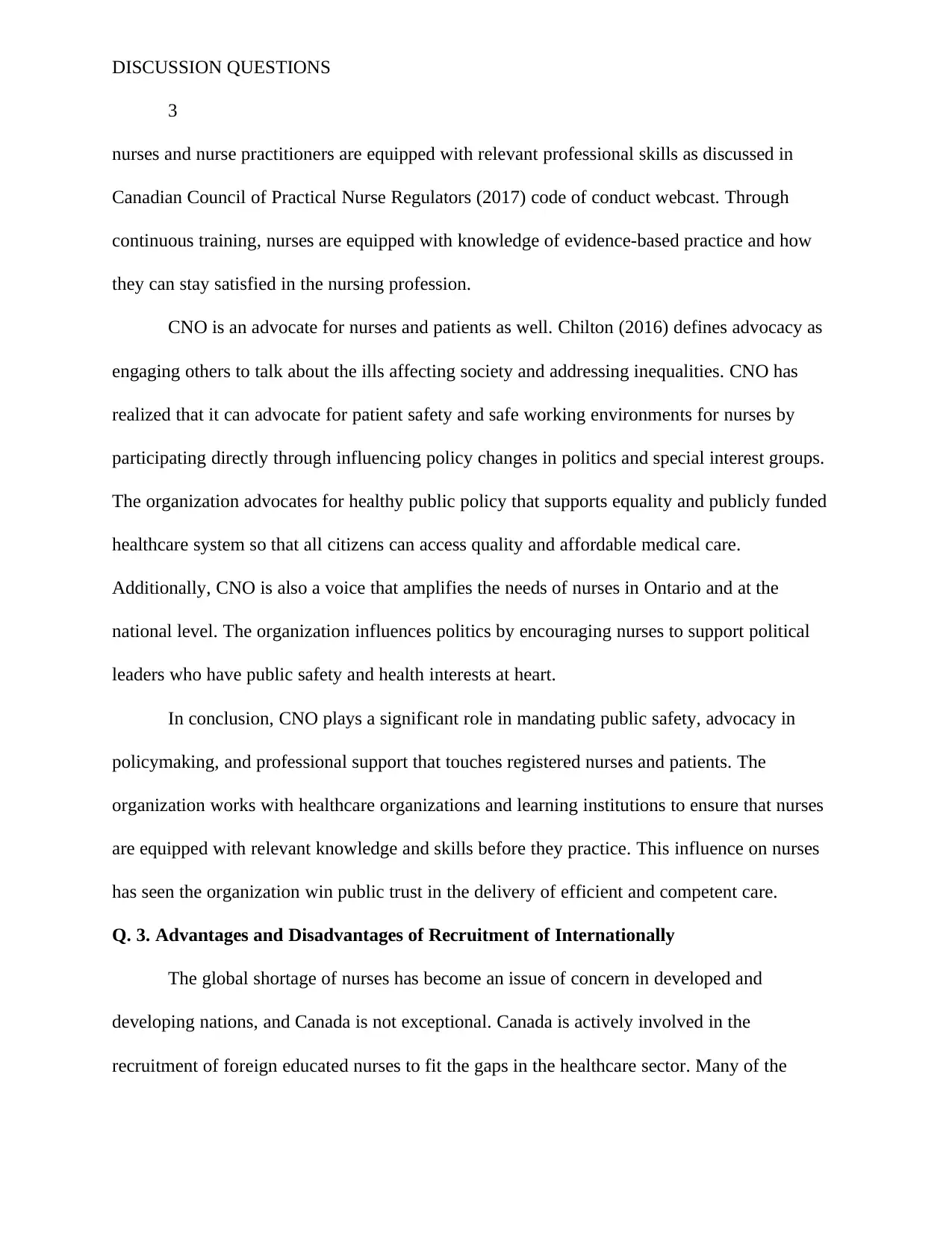
DISCUSSION QUESTIONS
3
nurses and nurse practitioners are equipped with relevant professional skills as discussed in
Canadian Council of Practical Nurse Regulators (2017) code of conduct webcast. Through
continuous training, nurses are equipped with knowledge of evidence-based practice and how
they can stay satisfied in the nursing profession.
CNO is an advocate for nurses and patients as well. Chilton (2016) defines advocacy as
engaging others to talk about the ills affecting society and addressing inequalities. CNO has
realized that it can advocate for patient safety and safe working environments for nurses by
participating directly through influencing policy changes in politics and special interest groups.
The organization advocates for healthy public policy that supports equality and publicly funded
healthcare system so that all citizens can access quality and affordable medical care.
Additionally, CNO is also a voice that amplifies the needs of nurses in Ontario and at the
national level. The organization influences politics by encouraging nurses to support political
leaders who have public safety and health interests at heart.
In conclusion, CNO plays a significant role in mandating public safety, advocacy in
policymaking, and professional support that touches registered nurses and patients. The
organization works with healthcare organizations and learning institutions to ensure that nurses
are equipped with relevant knowledge and skills before they practice. This influence on nurses
has seen the organization win public trust in the delivery of efficient and competent care.
Q. 3. Advantages and Disadvantages of Recruitment of Internationally
The global shortage of nurses has become an issue of concern in developed and
developing nations, and Canada is not exceptional. Canada is actively involved in the
recruitment of foreign educated nurses to fit the gaps in the healthcare sector. Many of the
3
nurses and nurse practitioners are equipped with relevant professional skills as discussed in
Canadian Council of Practical Nurse Regulators (2017) code of conduct webcast. Through
continuous training, nurses are equipped with knowledge of evidence-based practice and how
they can stay satisfied in the nursing profession.
CNO is an advocate for nurses and patients as well. Chilton (2016) defines advocacy as
engaging others to talk about the ills affecting society and addressing inequalities. CNO has
realized that it can advocate for patient safety and safe working environments for nurses by
participating directly through influencing policy changes in politics and special interest groups.
The organization advocates for healthy public policy that supports equality and publicly funded
healthcare system so that all citizens can access quality and affordable medical care.
Additionally, CNO is also a voice that amplifies the needs of nurses in Ontario and at the
national level. The organization influences politics by encouraging nurses to support political
leaders who have public safety and health interests at heart.
In conclusion, CNO plays a significant role in mandating public safety, advocacy in
policymaking, and professional support that touches registered nurses and patients. The
organization works with healthcare organizations and learning institutions to ensure that nurses
are equipped with relevant knowledge and skills before they practice. This influence on nurses
has seen the organization win public trust in the delivery of efficient and competent care.
Q. 3. Advantages and Disadvantages of Recruitment of Internationally
The global shortage of nurses has become an issue of concern in developed and
developing nations, and Canada is not exceptional. Canada is actively involved in the
recruitment of foreign educated nurses to fit the gaps in the healthcare sector. Many of the
⊘ This is a preview!⊘
Do you want full access?
Subscribe today to unlock all pages.

Trusted by 1+ million students worldwide
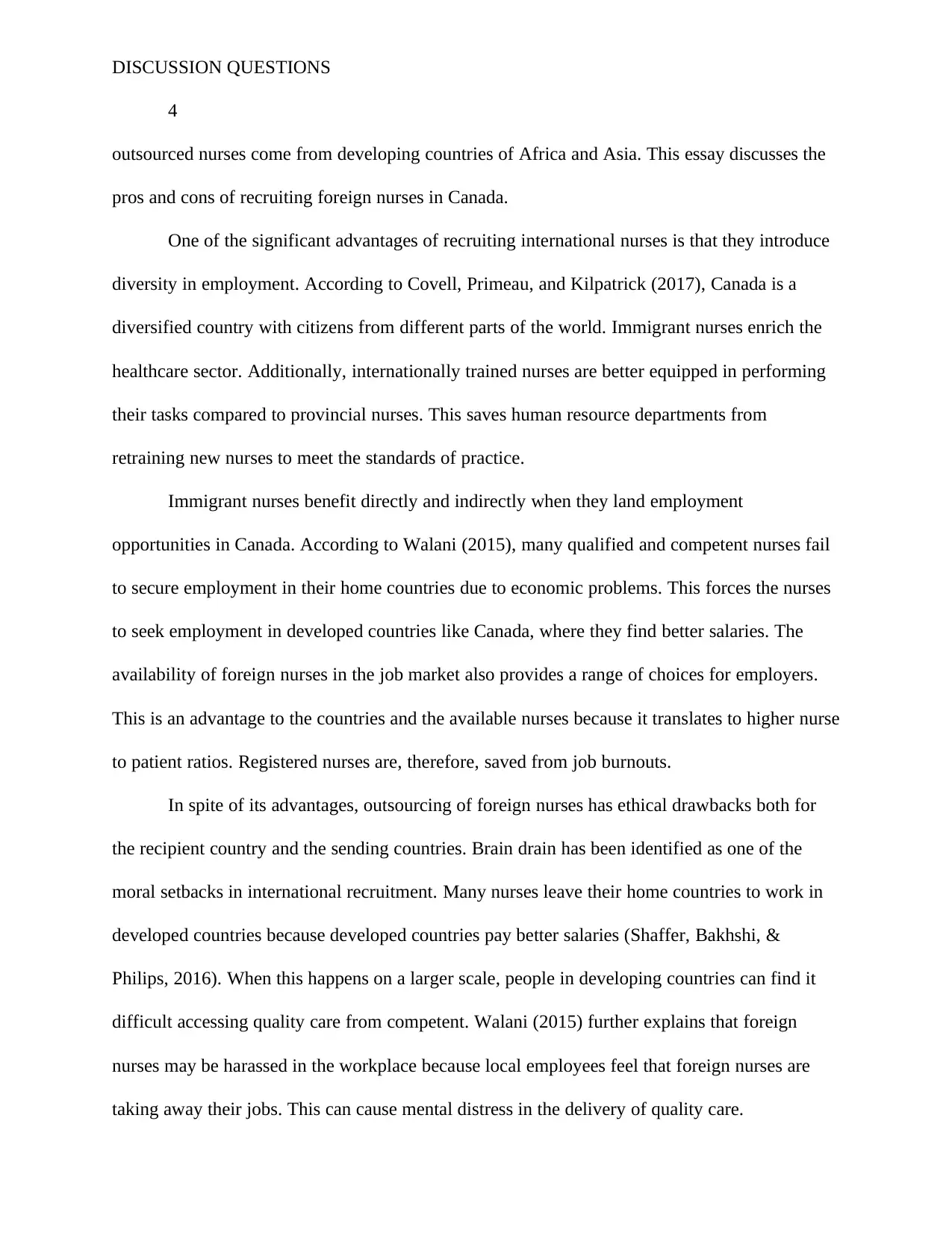
DISCUSSION QUESTIONS
4
outsourced nurses come from developing countries of Africa and Asia. This essay discusses the
pros and cons of recruiting foreign nurses in Canada.
One of the significant advantages of recruiting international nurses is that they introduce
diversity in employment. According to Covell, Primeau, and Kilpatrick (2017), Canada is a
diversified country with citizens from different parts of the world. Immigrant nurses enrich the
healthcare sector. Additionally, internationally trained nurses are better equipped in performing
their tasks compared to provincial nurses. This saves human resource departments from
retraining new nurses to meet the standards of practice.
Immigrant nurses benefit directly and indirectly when they land employment
opportunities in Canada. According to Walani (2015), many qualified and competent nurses fail
to secure employment in their home countries due to economic problems. This forces the nurses
to seek employment in developed countries like Canada, where they find better salaries. The
availability of foreign nurses in the job market also provides a range of choices for employers.
This is an advantage to the countries and the available nurses because it translates to higher nurse
to patient ratios. Registered nurses are, therefore, saved from job burnouts.
In spite of its advantages, outsourcing of foreign nurses has ethical drawbacks both for
the recipient country and the sending countries. Brain drain has been identified as one of the
moral setbacks in international recruitment. Many nurses leave their home countries to work in
developed countries because developed countries pay better salaries (Shaffer, Bakhshi, &
Philips, 2016). When this happens on a larger scale, people in developing countries can find it
difficult accessing quality care from competent. Walani (2015) further explains that foreign
nurses may be harassed in the workplace because local employees feel that foreign nurses are
taking away their jobs. This can cause mental distress in the delivery of quality care.
4
outsourced nurses come from developing countries of Africa and Asia. This essay discusses the
pros and cons of recruiting foreign nurses in Canada.
One of the significant advantages of recruiting international nurses is that they introduce
diversity in employment. According to Covell, Primeau, and Kilpatrick (2017), Canada is a
diversified country with citizens from different parts of the world. Immigrant nurses enrich the
healthcare sector. Additionally, internationally trained nurses are better equipped in performing
their tasks compared to provincial nurses. This saves human resource departments from
retraining new nurses to meet the standards of practice.
Immigrant nurses benefit directly and indirectly when they land employment
opportunities in Canada. According to Walani (2015), many qualified and competent nurses fail
to secure employment in their home countries due to economic problems. This forces the nurses
to seek employment in developed countries like Canada, where they find better salaries. The
availability of foreign nurses in the job market also provides a range of choices for employers.
This is an advantage to the countries and the available nurses because it translates to higher nurse
to patient ratios. Registered nurses are, therefore, saved from job burnouts.
In spite of its advantages, outsourcing of foreign nurses has ethical drawbacks both for
the recipient country and the sending countries. Brain drain has been identified as one of the
moral setbacks in international recruitment. Many nurses leave their home countries to work in
developed countries because developed countries pay better salaries (Shaffer, Bakhshi, &
Philips, 2016). When this happens on a larger scale, people in developing countries can find it
difficult accessing quality care from competent. Walani (2015) further explains that foreign
nurses may be harassed in the workplace because local employees feel that foreign nurses are
taking away their jobs. This can cause mental distress in the delivery of quality care.
Paraphrase This Document
Need a fresh take? Get an instant paraphrase of this document with our AI Paraphraser
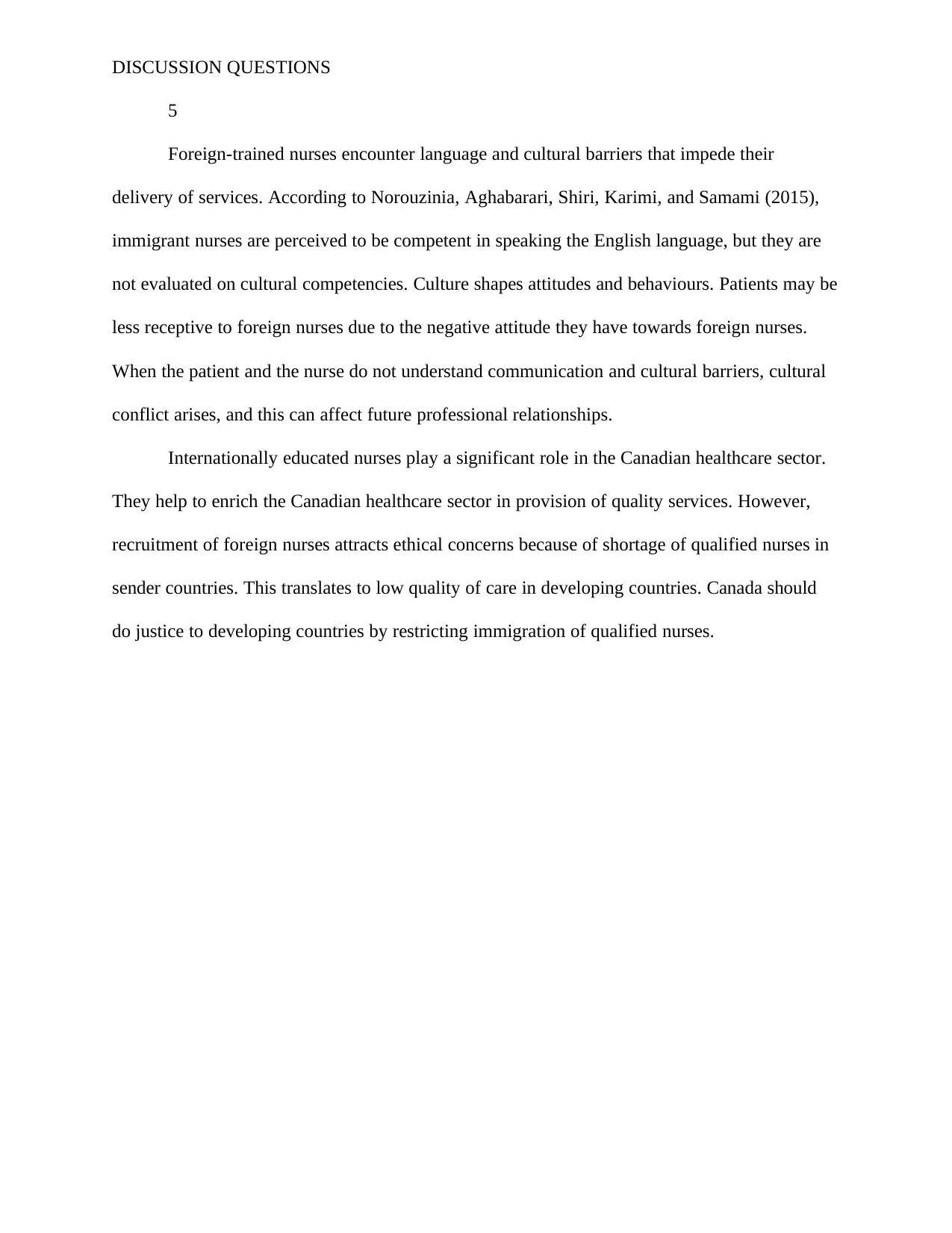
DISCUSSION QUESTIONS
5
Foreign-trained nurses encounter language and cultural barriers that impede their
delivery of services. According to Norouzinia, Aghabarari, Shiri, Karimi, and Samami (2015),
immigrant nurses are perceived to be competent in speaking the English language, but they are
not evaluated on cultural competencies. Culture shapes attitudes and behaviours. Patients may be
less receptive to foreign nurses due to the negative attitude they have towards foreign nurses.
When the patient and the nurse do not understand communication and cultural barriers, cultural
conflict arises, and this can affect future professional relationships.
Internationally educated nurses play a significant role in the Canadian healthcare sector.
They help to enrich the Canadian healthcare sector in provision of quality services. However,
recruitment of foreign nurses attracts ethical concerns because of shortage of qualified nurses in
sender countries. This translates to low quality of care in developing countries. Canada should
do justice to developing countries by restricting immigration of qualified nurses.
5
Foreign-trained nurses encounter language and cultural barriers that impede their
delivery of services. According to Norouzinia, Aghabarari, Shiri, Karimi, and Samami (2015),
immigrant nurses are perceived to be competent in speaking the English language, but they are
not evaluated on cultural competencies. Culture shapes attitudes and behaviours. Patients may be
less receptive to foreign nurses due to the negative attitude they have towards foreign nurses.
When the patient and the nurse do not understand communication and cultural barriers, cultural
conflict arises, and this can affect future professional relationships.
Internationally educated nurses play a significant role in the Canadian healthcare sector.
They help to enrich the Canadian healthcare sector in provision of quality services. However,
recruitment of foreign nurses attracts ethical concerns because of shortage of qualified nurses in
sender countries. This translates to low quality of care in developing countries. Canada should
do justice to developing countries by restricting immigration of qualified nurses.
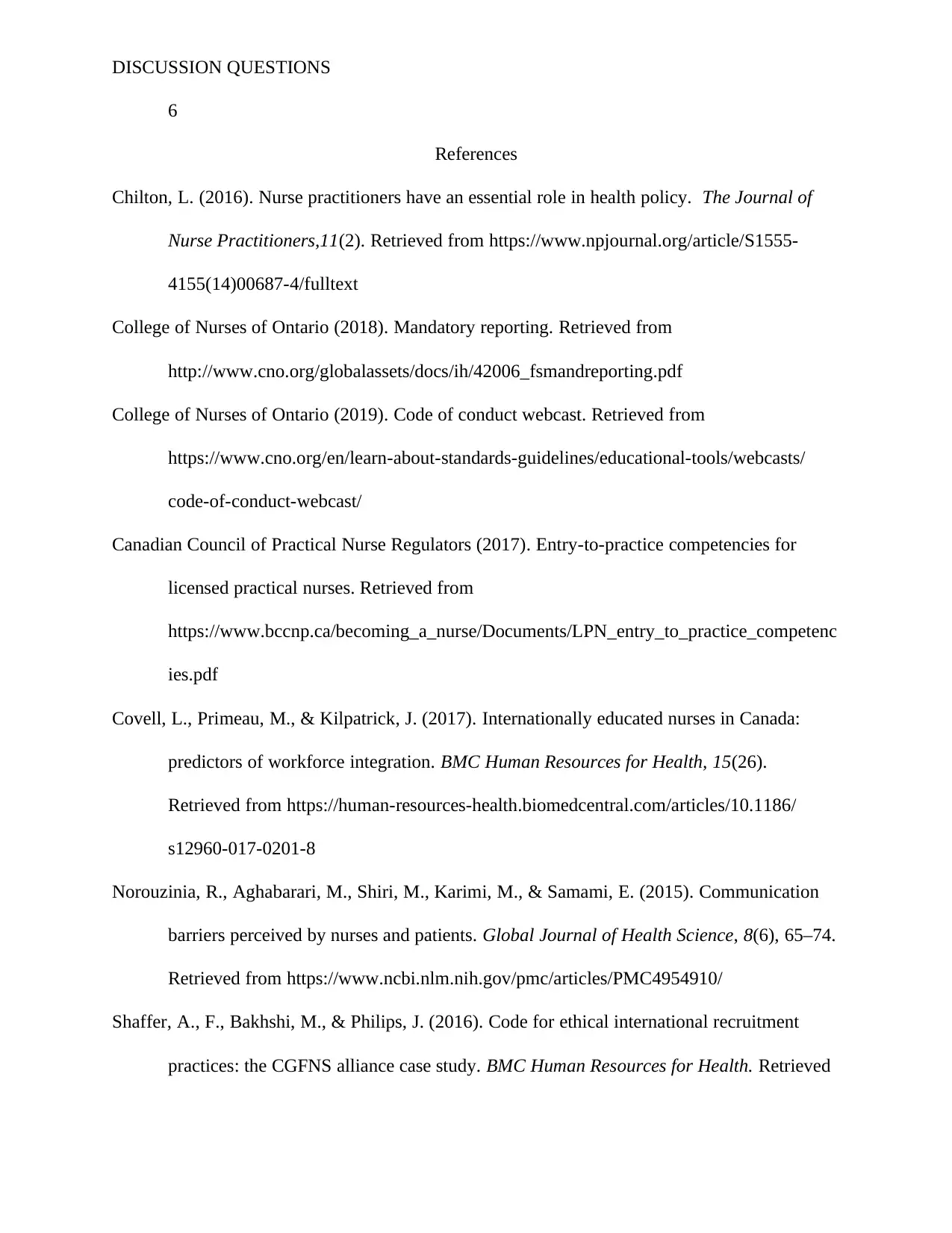
DISCUSSION QUESTIONS
6
References
Chilton, L. (2016). Nurse practitioners have an essential role in health policy. The Journal of
Nurse Practitioners,11(2). Retrieved from https://www.npjournal.org/article/S1555-
4155(14)00687-4/fulltext
College of Nurses of Ontario (2018). Mandatory reporting. Retrieved from
http://www.cno.org/globalassets/docs/ih/42006_fsmandreporting.pdf
College of Nurses of Ontario (2019). Code of conduct webcast. Retrieved from
https://www.cno.org/en/learn-about-standards-guidelines/educational-tools/webcasts/
code-of-conduct-webcast/
Canadian Council of Practical Nurse Regulators (2017). Entry-to-practice competencies for
licensed practical nurses. Retrieved from
https://www.bccnp.ca/becoming_a_nurse/Documents/LPN_entry_to_practice_competenc
ies.pdf
Covell, L., Primeau, M., & Kilpatrick, J. (2017). Internationally educated nurses in Canada:
predictors of workforce integration. BMC Human Resources for Health, 15(26).
Retrieved from https://human-resources-health.biomedcentral.com/articles/10.1186/
s12960-017-0201-8
Norouzinia, R., Aghabarari, M., Shiri, M., Karimi, M., & Samami, E. (2015). Communication
barriers perceived by nurses and patients. Global Journal of Health Science, 8(6), 65–74.
Retrieved from https://www.ncbi.nlm.nih.gov/pmc/articles/PMC4954910/
Shaffer, A., F., Bakhshi, M., & Philips, J. (2016). Code for ethical international recruitment
practices: the CGFNS alliance case study. BMC Human Resources for Health. Retrieved
6
References
Chilton, L. (2016). Nurse practitioners have an essential role in health policy. The Journal of
Nurse Practitioners,11(2). Retrieved from https://www.npjournal.org/article/S1555-
4155(14)00687-4/fulltext
College of Nurses of Ontario (2018). Mandatory reporting. Retrieved from
http://www.cno.org/globalassets/docs/ih/42006_fsmandreporting.pdf
College of Nurses of Ontario (2019). Code of conduct webcast. Retrieved from
https://www.cno.org/en/learn-about-standards-guidelines/educational-tools/webcasts/
code-of-conduct-webcast/
Canadian Council of Practical Nurse Regulators (2017). Entry-to-practice competencies for
licensed practical nurses. Retrieved from
https://www.bccnp.ca/becoming_a_nurse/Documents/LPN_entry_to_practice_competenc
ies.pdf
Covell, L., Primeau, M., & Kilpatrick, J. (2017). Internationally educated nurses in Canada:
predictors of workforce integration. BMC Human Resources for Health, 15(26).
Retrieved from https://human-resources-health.biomedcentral.com/articles/10.1186/
s12960-017-0201-8
Norouzinia, R., Aghabarari, M., Shiri, M., Karimi, M., & Samami, E. (2015). Communication
barriers perceived by nurses and patients. Global Journal of Health Science, 8(6), 65–74.
Retrieved from https://www.ncbi.nlm.nih.gov/pmc/articles/PMC4954910/
Shaffer, A., F., Bakhshi, M., & Philips, J. (2016). Code for ethical international recruitment
practices: the CGFNS alliance case study. BMC Human Resources for Health. Retrieved
⊘ This is a preview!⊘
Do you want full access?
Subscribe today to unlock all pages.

Trusted by 1+ million students worldwide
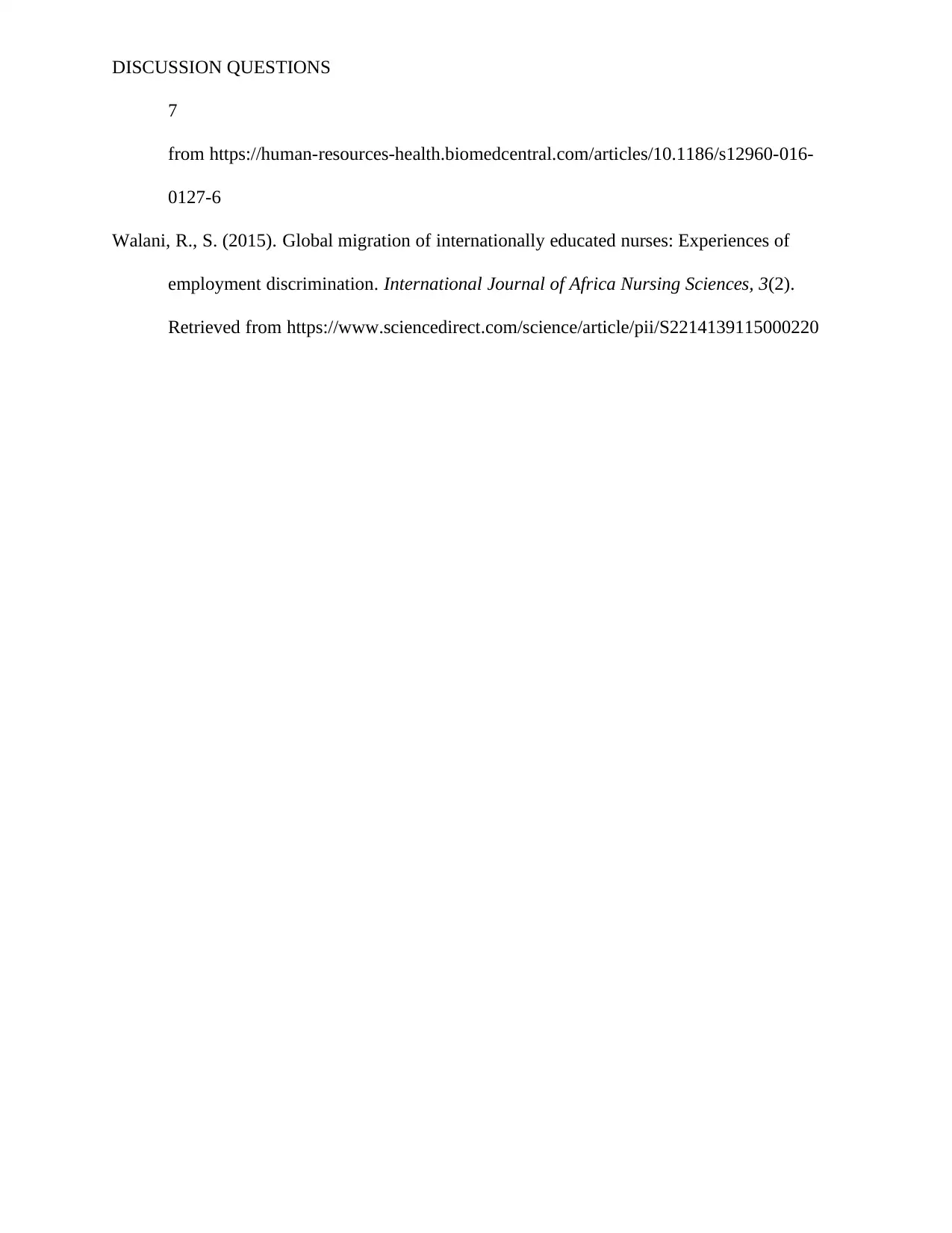
DISCUSSION QUESTIONS
7
from https://human-resources-health.biomedcentral.com/articles/10.1186/s12960-016-
0127-6
Walani, R., S. (2015). Global migration of internationally educated nurses: Experiences of
employment discrimination. International Journal of Africa Nursing Sciences, 3(2).
Retrieved from https://www.sciencedirect.com/science/article/pii/S2214139115000220
7
from https://human-resources-health.biomedcentral.com/articles/10.1186/s12960-016-
0127-6
Walani, R., S. (2015). Global migration of internationally educated nurses: Experiences of
employment discrimination. International Journal of Africa Nursing Sciences, 3(2).
Retrieved from https://www.sciencedirect.com/science/article/pii/S2214139115000220
1 out of 7
Related Documents
Your All-in-One AI-Powered Toolkit for Academic Success.
+13062052269
info@desklib.com
Available 24*7 on WhatsApp / Email
![[object Object]](/_next/static/media/star-bottom.7253800d.svg)
Unlock your academic potential
Copyright © 2020–2026 A2Z Services. All Rights Reserved. Developed and managed by ZUCOL.





